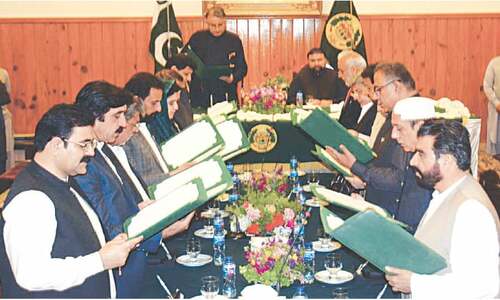ISLAMABAD, March 18: The United Nations Educational, Scientific and Cultural Organisation (Unesco) has declined Pakistan's request for heritage status for its three cities of historical importance citing the government's neglect of these ancient treasures as a major reason.
In 2010, Pakistan sent 10 entries for the Unesco world heritage status. The government was particularly pushing for recognition of the 7,000 BC Mehergarh in Balochistan, one of the most important Neolithic sites in archaeology, the pre-Harappa 4,000 BC Rehman Dheri in Khyber Pakhtunkhwa and the 2,600 BC Harappa site in Punjab, with one of the most fascinating and mysterious cultures of the world.
“There is certain criterion that must be met before Unesco inducts the sites into the world heritage list. Sadly, none of the sites fulfil world standard requirements,” said an official with Unesco, explaining how Pakistan had committed to support the UN body in its resolve to promote diversity of cultures.
This was corroborated by the Department of Museums and Archaeology (DOAM) when one of its officials said the archaeological sites were missing basic public facilities.
The official confirmed that ancient sites like Mehergarh and Rehman Dheri lacked proper approaches or access roads, public buildings, information booths and cafeterias, while conservation efforts had stopped long ago. Besides, so many other efforts were needed for them to be members of the world heritage list.
According to DOAM, most of the ancient sites have only been 10 per cent excavated. The official explained that once evidence was removed from an important site, it was damaged.
“In most cases, it is better to leave the sites buried until there is right technology available and resources to unearth hidden architecture. May be future generations will have more resources and improved technology to unearth mysteries of the past,” the official explained.
According to the department, Mehergarh, sitting between Quetta and Sibbi, was first excavated in early 1970s that continued till 1985-86 and then stopped. The evidence collected was thoroughly investigated and studied.
A possible contemporary of Mehergarh, Rehman Dheri (in tribal areas) near D.I. Khan was inaccessible, lacked facilities for tourists and conservation works were also non-existent there.
Harappa, near Sahiwal, did not only suffer destructions at the hands of arriving Aryans but later under British Raj that stole bricks from the ruins to build rail tracks. In 2005, a controversial amusement park scheme at the site was abandoned when builders unearthed many archaeological artifacts during the early stages of the construction work.
“A town sits over the original site. However, some open area had been acquired outside the settlement where most of architecture was still buried,” said the official, pointing out that now the responsibility fell on the provinces to push Unesco to recognise these historical architectures.
Nonetheless, the government is now trying for recognition of the other seven archaeological sites such as the Shrine of Shah Rukhn-i-Alam in Multan, the Buddhist Monastery/Stupa of Rani Ghaat in Mardan district and tombs in Uch Sharif in Bahawalpur to mention some.
“These sites enjoy living tourism as we call it. There are basic facilities and the few missing can be developed,” the official said.
Adviser to the prime minister on social sector and Unesco, Shahnaz Wazir Ali was a lot more optimistic when she said nothing had been rejected by Unesco.
The sites nominated hopefully would be inscribed in the world heritage list, she added.
“It's a very rigorous process that requires thorough processing. The sites nominated must have worldwide heritage value for recognition. Basic facilities are a secondary matter,” said Ms Ali.
The last time a historical site in Pakistan was inducted into the world heritage list was back in 1997. Rohtas Fort was recognised by the world as an exceptional example of early Muslim architecture.















































Dear visitor, the comments section is undergoing an overhaul and will return soon.